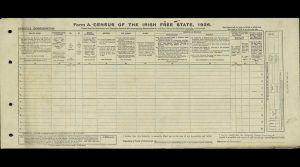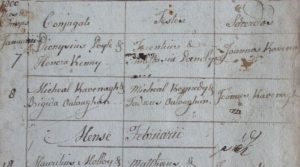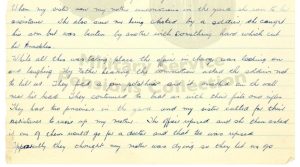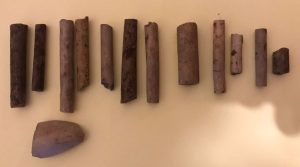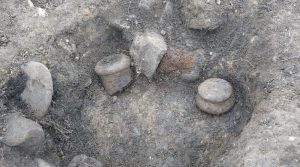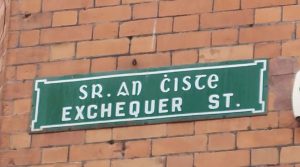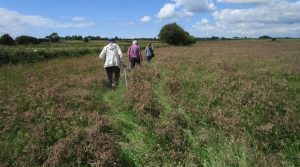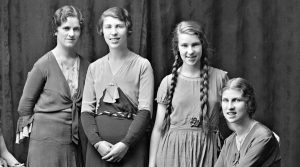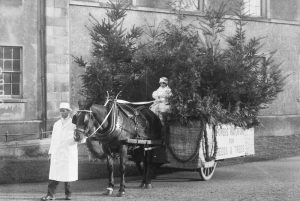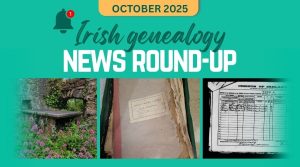In our Irish genealogy news round-ups, we share the latest developments and discoveries in Irish family history research, from newly digitized records and online tools to local projects and events. Highlights this month include new military, church, land and burial records for several counties, all free to access, plus passenger lists, census substitutes and newspapers. There are also lots of upcoming webinars and advice sessions covering essential genealogy topics, along with special offers.
For a quick overview of some of the main news stories, watch our video below (just press play) or scroll down for the full round-up and in-depth updates.
Newly digitized burial and headstone records for Dublin, Kerry, Limerick and Wexford (free)
New headstone transcriptions and photographs from four graveyards have been added to the free Ireland Genealogy Projects (IGP) online archive, which is run entirely by volunteers:
- Dublin: Glasnevin Cemetery
- Kerry: Cloghane old burial ground
- Limerick: Abbeyfeale cemetery
- Wexford: Tomhaggard old graveyard
A D V E R T I S E M E N T
Separately, Mount Jerome Cemetery in Harold’s Cross on the south side of Dublin city, one of Ireland’s largest burial grounds at over 47 acres and with 225,000 interments, has launched a free searchable online database of its burial records. Users can search by name, date range and grave number, with each result listing the grave and interment numbers, name, age and burial and death dates. The “all interments” option shows everyone buried in the same plot. Only about 40% of the graves in the database are currently locatable on the interactive map, with more to be added soon. Often, search results take you directly to the grave’s location, but if not, simply note the grave number and you can find it manually by zooming and panning. You can search the Mount Jerome database here.

Established in 1836 as Ireland’s first privately owned burial ground, Mount Jerome was traditionally favoured by Protestants. It boasts one of the finest collections of Victorian memorials, tombs and crypts in Ireland. Notable figures buried there include Arthur Guinness II (1768–1855), surveyor Richard Griffith (1784–1878), known for Griffith’s Valuation, writer John Millington Synge (1871–1909) and painter Jack B. Yeats (1871–1957). Read about some of the famous figures buried in Mount Jerome here.
Newly digitized land records for Clare, Galway, Offaly, Tipperary, Westmeath and Wexford (free)
The free-to-access Ireland Genealogy Projects (IGP) online archive recently added a range of land records:
- Clare: Tenants on the O’Brien estate in Newmarket-on-Fergus, 1738
- Galway: Tenants on the Trench estate in Kilconnell Barony, 1840–50
- Offaly: Tenants on the Prittie estate, 1826
- Tipperary: Tenants on the Prittie estate, 1826; Tenants on the Kingston estate in Ballyporeen, 1840; Tenants on the Trant estate in Dovea, 1837
- Westmeath: Workers on the Lyons estate in Mullingar parish, 1820
- Wexford: Tenants on the Ram estate in Gorey, 1826
Sign up to our newsletter
Newly digitized church records for Tyrone (free)
The free-to-access Ireland Genealogy Projects (IGP) online archive has also added a new set of transcribed marriage records from the 2nd Presbyterian Church in Leckpatrick (Artigarvan), Co. Tyrone, covering the years 1845–1921. They list the marriage date, names, ages, addresses, occupations and status of the bride and groom, as well as the names and occupations of the fathers and the names of the witnesses. You can access the records here.
>>> YOU MIGHT ALSO LIKE: A guide to navigating Northern Ireland’s church records
Newly digitized relief records for Wexford (free)
The free-to-access Ireland Genealogy Projects (IGP) online archive has also added a new set of parish relief records – a poor list from Co. Wexford covering the years 1813 to 1820 and naming individuals who received assistance from the Church of Ireland parishes of Killinick, St Iberius, Maglass, Kilmacree and Killaine. Although extracted from a Killinick parish register, the relief extended to those in neighbouring parishes. You can access the records here.
>>> YOU MIGHT ALSO LIKE: Did your ancestor spend time in a workhouse?
Irish Military Archives – latest release (free)
This month, the Irish Military Archives released online over 2,110 new files from the Military Service Pensions Collection (1916–23). The latest release pertains to 865 individuals/veterans or their dependants with addresses in Cork, Dublin, Kerry, Limerick, Tipperary, Northern Ireland, England, Jersey, the USA and Canada. The files include:
- 268 claims lodged under the Military Service Pensions Act 1924 (National Army applicants)
- 404 claims lodged under the Military Service Pensions Act 1934
- 113 pensions or gratuities awarded under the Army Pensions Acts (these relate to disability or wound claims and to applications lodged by the dependants of deceased members)
Please help support
Irish Heritage News
A small independent start-up in West Cork
Give as little as €2
Thank You
View the full list of those named in the latest release here or search the Military Service Pensions Collection records here.
More civil parishes added to Galway digital heritage project (free)
Detailed research on the townlands in four more civil parishes in Co. Galway has been digitized as part of a collaborative project led by the Galway County Heritage Office and the University of Galway. The newly added parishes are Monivea, Moycullen, Moylough and Stradbally (Clarinbridge). The project aims to make local history more accessible by digitizing the history of each townland and its inhabitants using historical sources and interactive mapping tools. For each townland, information has been quoted and analysed from a variety of records and sources, including Logainm.ie, Ordnance Survey Letters and Field Name Books, Griffith’s Valuation, the Down Survey and the 1901 and 1911 censuses, with links (usually) to each source or record.
Co. Galway has over 4,000 townlands and, to date, nearly half have been included in the project. The “places” section of the Galway County Heritage Office website can be accessed here; however, the site can be challenging to navigate as the townland research is spread across various pages depending on the civil parish or area. We recommend searching for the townland (or alternatively the civil parish) using the search bar, but first confirm the standardized spelling on Townlands.ie or Logainm.ie.
Registry of Deeds records (free)
The volunteer-run Registry of Deeds Index Project has now indexed 630,096 records from 64,721 memorials of deeds as of 22 June. There are also 703,835 townland index entries (as of 28 May) and 52,757 grantor index entries (as of 24 May). The database is free to search here.

Earlier this year, FamilySearch introduced a new search tool for Registry of Deeds records. It uses AI-generated transcriptions and summaries. You can search the Registry of Deeds records on FamilySearch for free here.
>>> RELATED: FamilySearch updates its Irish collections with more free searchable church records, deeds and dog licences
If you make progress using the FamilySearch search tools, consider submitting your findings to the Registry of Deeds Index Project to support the wider research community.
Latest Irish additions to FamilySearch collections (free)
FamilySearch has recently indexed 2,827,849 new Catholic parish register records from Ireland, making them fully searchable here.
A D V E R T I S E M E N T
Over the past year, FamilySearch has been developing an AI-powered full-text search tool to help locate ancestors in record collections that have not yet been transcribed and indexed. This full-text search tool is now available here or in the all-collections search on the FamilySearch home page and in the FamilySearch catalog. You can learn more about how to use the full-text search tool here.
Remember, all FamilySearch records are free to access, but you need to create a free account and be logged in to search and view them.
Church records in RCB Library – an update
Professional genealogist Claire Bradley shared an update about the Church of Ireland parish records held in the Representative Church Body (RCB) Library in Churchtown, Dublin 14. Following a recent visit, she learned that nearly all of these parish records have now been scanned and their digital images are accessible on two computers in the library’s reading room. The library plans to use Transkribus software to transcribe the records, but no timeframe has been set for this work. There are currently no plans to make the records available online.
You can visit the RCB Library website here to plan a visit and sign up for Claire Bradley’s monthly newsletter here.
Passenger lists
A new record set on the subscription site FindMyPast features over 16 million passenger list entries detailing journeys into Ireland and Britain between 1878 and 1960. They record migrants arriving for various reasons, including work, education, religious freedom or a new start. Each record includes a transcript and an image of the original passenger manifest, listing key details such as name, age, occupation, last residence, departure port and arrival port. Using both incoming and outgoing lists together can help trace round-trip journeys or multiple migrations. You can search the records here. FindMyPast is offering special promotions at the moment (scroll down for more details).
A F F I L I A T E A D

RootsIreland – latest additions for Antrim, Down and Tipperary
The subscription site RootsIreland has added over 78,000 new records to its database this month. The bulk comes from the north, with over 69,000 new historical records for Antrim and Down now available to search. These include:
- Hertford Estate Rent Roll, 1728: names tenants in the parishes of Blaris (includes the town of Lisburn), Lambeg, Derriaghy, Magheragall, Magheramesk, Aghalee, Aghagallon, Glenavy, Camlin and Tullyrusk
- Electors of the Borough of Belfast, 1832 and 1865: register of qualified voters, listing their names, occupations, addresses and the candidates they voted for
- Anti-Repeal Declaration, 1848: names of Antrim and Down residents who signed a petition opposing the repeal of the Union, along with their occupations and addresses
- Index to 1796 Flaxgrowers Bounty List: names of farmers in Antrim and Down awarded spinning-wheels or looms by the Irish Linen Board
- Royal Irish Constabulary Registry of Households, Knocknacarry, Co. Antrim, 1881–1901: includes names and commentary on deaths, marriages, emigration and military service
- Census of Protestant Householders, 1740: transcriptions of destroyed records for parishes across Antrim and parts of Down
- Ulster Muster Roll, c.1630: names of able-bodied men (settlers) capable of military service
- Old Age Pension Proof of Age Extraction Claim Forms, 1841 and 1851: used to prove age for pension eligibility
- 1861 Census of Bangor Parish, Co. Down: partial list of residents by townland, with name of landlord and other commentary
- Ulster Directory, 1900: lists names, addresses and occupations
- 1803 Agricultural Census: lists names and addresses of farmers
A D V E R T I S E M E N T
RootsIreland has categorized these records as “census substitutes” and they can be browsed under this category for Antrim here and for Down here.
RootsIreland has also added almost 9,000 baptism and marriage records from the Roman Catholic parish of Knockavilla in South Tipperary, covering the years 1834 to 1905. They can be searched here.
You must be logged in and have an active subscription to search the records on RootsIreland.
British Newspaper Archive – latest Irish additions
The British Newspaper Archive continues to expand its Irish collection, with several titles seeing new issues added this month:
- Irish Church Advocate (also known as Church Advocate), published in Dublin, available years: 1876–78
- Midland Counties Advertiser, published in Roscrea, Co. Tipperary, available years: 1854–1948
- Midland Reporter and Westmeath Nationalist (also known as Westmeath Nationalist and Midland Reporter), published in Mullingar, Co. Westmeath, available years: 1897–1939 (with gaps in coverage)
- Newry Telegraph (also known as Newry Commercial Telegraph), published in Newry, Co. Down, available years: 1813–1965 (with gaps in coverage)
- Roscommon Herald, published in Boyle, Co. Roscommon, available years: 1859–1953
- Saunders’s News-Letter (also known as Saunders’ Irish Daily News), published in Dublin, available years: 1773–1879 (with gaps in coverage)
A F F I L I A T E A D 
The archive now includes more than 280 Irish newspaper titles, with more titles and issues added regularly. The British Newspaper Archive is accessible via subscription, with a limited-time 25% discount currently available on all plans using the code: SUMMER25 – find out more here. You can also access the archive with a FindMyPast subscription – they’re also offering special promotions at the moment (scroll down for more details).
Second season of Irish surname docuseries Sloinne has aired
TG4’s documentary series “Sloinne” (meaning surname) explores the origins and history of some of Ireland’s most common surnames. Each 50-minute episode follows a special guest who, with the help of genealogists and historians, investigates their own family history and the story behind their surname. The first season aired last year and the second has just finished airing. The latest season focused on seven surnames: Fitzgerald / Mac Gearailt, O’Brien / Ó Briain, O’Neill / Ó Néill, Keane / Ó Catháin, Power / de Paor, Lynch / Ó Loingsigh and Gallagher / Ó Gallachóir, while the first season focused on the surnames Flaherty / Ó Flaithearta, Murphy / Ó Murchú, Kelly / Ó Ceallaigh, O’Sullivan / Ó Súilleabháin, O’Donnell / Ó Domhnaill, Joyce / Seoighe and O’Connor / Ó Conchubhair. Each episode includes visits to ancestral homesteads, historical sites and landmarks associated with the family name.
>>> RELATED: Two seasons of Sloinne, TG4’s Irish surname series, now available to watch online
The full series is now available to watch on the TG4 Player here.
Genealogy webinars
On Wednesday, 2 July at 10am (IST), professional genealogist Natalie Bodle from Co. Antrim will host a free webinar titled “Irish Ancestors – 5 More Essential Websites You Need to Know About”. She will cover five key resources – the National Archives, Griffith’s Valuation, the Registry of Deeds, RootsIreland and the British Newspaper Archive – highlighting the types of records available and offering practical search tips. You can register for this free webinar here.
Also on Wednesday, 2 July at 7pm (GMT+1) is a live Zoom webinar organized by Family Tree with DNA expert Michelle Leonard. Aimed at complete beginners, Michelle will introduce the basics of using DNA for family history research, covering key concepts such as inheritance and ethnicity results, as well as looking at real-life examples. Tickets cost £10 (free for Family Tree Plus members) and will be available to watch on demand for one week after the live presentation. Buy your tickets on Eventbrite here.
A D V E R T I S E M E N T
Looking ahead to Wednesday, 6 August at 10am (IST), professional genealogist Claire Bradley will present a free webinar titled “Why You Want Irish Quaker Ancestors”. This lecture explores the history and influence of the Irish Quaker community, which had strong links to Pennsylvania. Irish Quakers kept detailed personal and business records that contain rich genealogical data. The talk will also discuss what a large-scale DNA project might reveal about this community. You can register for this free webinar here. It will be available to watch on demand for one week after the live presentation.
A D V E R T I S E M E N T

Genealogy advice sessions and DNA workshop
Dublin:
The National Archives of Ireland offers a free genealogy advisory service to the public, staffed by members of Accredited Genealogists Ireland (AGI). This weekday walk-in service provides expert advice to anyone researching their Irish ancestry, whether a beginner or an experienced researcher. No reader’s ticket is required; simply bring along any details you’ve gathered about your Irish ancestor. More information is available here.
Claire Bradley will lead a DNA workshop at Fingal Local Studies & Archives in Swords, Co. Dublin, on Tuesday afternoon, 8 July. The workshop is designed to help participants interpret their DNA results for family history research. Attendees must have access to their test results on the day. Spaces are limited and booking is essential. To book, email archives@fingal.ie or call (01) 8704486.
Mayo:
The Mayo Genealogy Group will hold a free informal drop-in session on Saturday morning, 12 July, at the National Museum of Ireland – Country Life in Turlough Park, Castlebar, offering advice to anyone researching their Irish family history. New and experienced researchers are welcome – no booking required. More information here. The Mayo Genealogy Group typically meets on the second Saturday of every month at the museum.
Online:
The Genealogical Society of Ireland hosts a free weekly research advice session every Wednesday at 11am (Irish time) via Zoom. Open to all, it covers all aspects of family history. Keep an eye on their Facebook page here for Zoom links and passcodes.
Genealogy courses and research programmes
Malahide Community School in Dublin will run a 10-week course, titled “How to Research Your Family History”, on Monday evenings starting on 15 September. Taught by Claire Bradley, this course covers a range of Irish genealogy records – including census, civil, church, land and military – as well as DNA testing. Aimed at beginners, it takes place in person and costs €110. More information here.
Registration is still open for the Ulster Historical Foundation’s 2025 online research programmes, taking place in September and October. These programmes offer guided assistance to those tracing Irish or Scots-Irish ancestry. Places are limited and early booking is recommended – a reduced deposit of £100 (usually £200) is currently being accepted. Find out more here.
A D V E R T I S E M E N T
Genealogy festivals, conferences and gatherings
East Donegal Family History Festival
Organized by Monreagh Heritage Centre, the East Donegal Family History Festival is currently underway and runs until 27 June. Celebrating local heritage, the festival programme includes guided tours, workshops, a nostalgic film night and one-to-one genealogy advice sessions. All events are free to attend. Tickets and further details are available on Eventbrite here.
Ó Dochartaigh (Doherty) gathering
The Ó Dochartaigh Clann Association will hold an in-person gathering at McGrory’s Hotel in Culdaff, Co. Donegal, on Wednesday, 23 July at 7.30pm. The non-profit group, active since the 1980s, has been hosting virtual events in recent years and is now inviting Dohertys from around the world to reconnect in person, with a Zoom option still available for those who can’t attend. The gathering is free and you can email info@odochartaighassociation.org for more information.
>>> YOU MIGHT ALSO LIKE: The story of O’Doherty’s Keep, a medieval tower house in Buncrana
Newfoundland conference to explore Irish connections
The Family History Society of Newfoundland and Labrador will host its Rockbound Roots conference from 25–27 July in St John’s, with two presentations of particular interest to those with Irish roots. Raymond M. Keogh will discuss the Southeast Ireland and Newfoundland Identity Project (SINIP), which explores the links between the Keough / Kehoe / Keogh families in southeast Ireland and Newfoundland using historical and genetic research, including Big Y-700 DNA testing. Historian Willeen Keough will challenge the familiar narrative of male-dominated Irish emigration by focusing on women’s experiences in early Irish-Newfoundland communities. Tickets cost $150 and can be purchased on the conference website here.
Sign up to our newsletter
New exhibition on the Irish passport
EPIC The Irish Emigration Museum has launched “On the Move”, a multimedia exhibition investigating the history of the Irish passport. Using archival records and contributions from the public, the exhibition highlights stories of migration and the Irish diaspora while also reflecting on the recent rise in passport applications. EPIC is open daily and the exhibition is included with the museum ticket. Tickets are available here.
Genealogy experience at Kilkea Castle
In May, Kilkea Castle in Castledermot, Co. Kildare, launched a new genealogy experience for guests, led by professional genealogist Paul Gorry. This service offers a highly personalized one-to-one consultation in one of Ireland’s oldest inhabited castles. But the genealogical research begins well in advance of the guest’s stay.

Once a guest expresses interest, an initial exchange of information by email takes place to assess whether worthwhile research is possible. If so, Paul conducts the research ahead of the guest’s stay. The highlight of the experience is the face-to-face meeting at the castle, where guests receive a written report and go through the findings with Paul in person. Ideally, the process should begin three to four months before the visit to allow sufficient time for the research to be completed, although shorter lead times may sometimes be accommodated. Find out more here.
In DNA news
You can now link your FamilyTreeDNA account directly to WikiTree – the free, collaborative global family tree – making it easier to collaborate with your DNA matches. Users can share their WikiTree ID and family tree, with the integration linking Y-DNA, mtDNA and autosomal test results to WikiTree profiles, helping matches better understand how they’re related and how they fit into the bigger picture. A simple one-click setup connects your DNA results to WikiTree, allowing matches to view your family tree and all your research instantly. More information here.
>>> YOU MIGHT ALSO LIKE: A genealogist’s guide to DNA testing for Irish family history research
Special offers
Please note: Some or all of the offers listed below may have expired since this article was published.
20% off RootsIreland annual subscriptions
From 1 July, RootsIreland is offering 20% off 12-month subscriptions until midnight (Irish time) on 16 July 2025. Reductions are also available on six-month subscriptions. The site holds over 23 million records, with the database continually growing and provides the most complete and accurate Roman Catholic church records online, plus millions of Protestant records, civil records, headstone transcriptions and more. Subscribing also supports 32 local genealogy centres across Ireland. Subscribe here.
20% off Green Room annual subscriptions
You can save 20% on Green Room membership from the folks who bring you A Letter from Ireland. Annual Green Room membership is reduced from US$237 to US$189 and includes in-depth, practical training and resources with support from experienced Irish genealogists and a community of over 6,500 fellow members. Offer ends midnight (PDT) on 10 July 2025. Subscribe here.
Save up to 50% on FindMyPast subscriptions
Right now you can get up to 50% off your first year with FindMyPast. Discounts are also currently available for other plans, with yearly, monthly and quarterly options. A subscription with FindMyPast gives you full access to billions of Irish and British records, over 2,000 newspaper titles dating back to the 1700s, 5 million family trees and a range of tools to help you trace your Irish roots. Offer ends Sunday, 29 June 2025. See their plans here. If you’ve never used FindMyPast before, you can try it for free for seven days here.
A F F I L I A T E A D
$2.50 Fold3 subscription
Fold3, a military records site owned by Ancestry, is marking the 250th anniversary of the US Army with a one-month premium subscription for just $2.50. This offer provides new users with unlimited access to over 640 million records, including service files, photos and personal documents from major conflicts such as the US Revolutionary War, the Civil War, both World Wars and more. It also covers records from the UK, Canada, Australia, New Zealand and elsewhere. The offer ends at 11.59pm (MT) on Monday, 30 June 2025. After the first month, the subscription renews at the standard monthly rate (currently $7.95). Given the scale of Irish enlistment in foreign armies, Fold3 is a valuable tool for anyone researching their Irish ancestors in the armed forces.
Buy the $2.50 premium access here or try a seven-day free trial here.
We recently featured a remarkable first-hand account by Cork-born medical officer Dr Jeremiah O’Sullivan, which reveals the harsh realities faced by the Royal Army Medical Corps amid some of World War 2’s fiercest fighting. Read the full story here.
YOU MIGHT ALSO LIKE:
- Cork doctor’s reflections on service in North Africa and Italy during World War 2
- Healing hands on the frontlines: Cork medical graduates in World War 2
A D V E R T I S E M E N T
Save 62% on DNA kits
MyHeritage’s DNA kit is now just €33 plus shipping (usually €89). The test provides an overview of your ethnic origins and can help you find new relatives through shared DNA. For the same price, you can also get the kit with a 30-day free trial of their complete plan, which includes access to over 35 billion records, photo tools and full family tree features. After the trial, the plan renews at €99 for the first year (usually €199). More details here.
Advertising Disclaimer: This article contains affiliate links. Irish Heritage News is an affiliate of FindMyPast and the British Newspaper Archive. We may earn commissions from qualifying purchases.
READ NOW
➤ 175,000 historical records released online on 103rd anniversary of Public Record Office fire
➤ Irish civil records: what’s online and what’s not online?
➤ Did your ancestor spend time in a workhouse?
➤ Find your ancestors in Ireland’s historical school records



